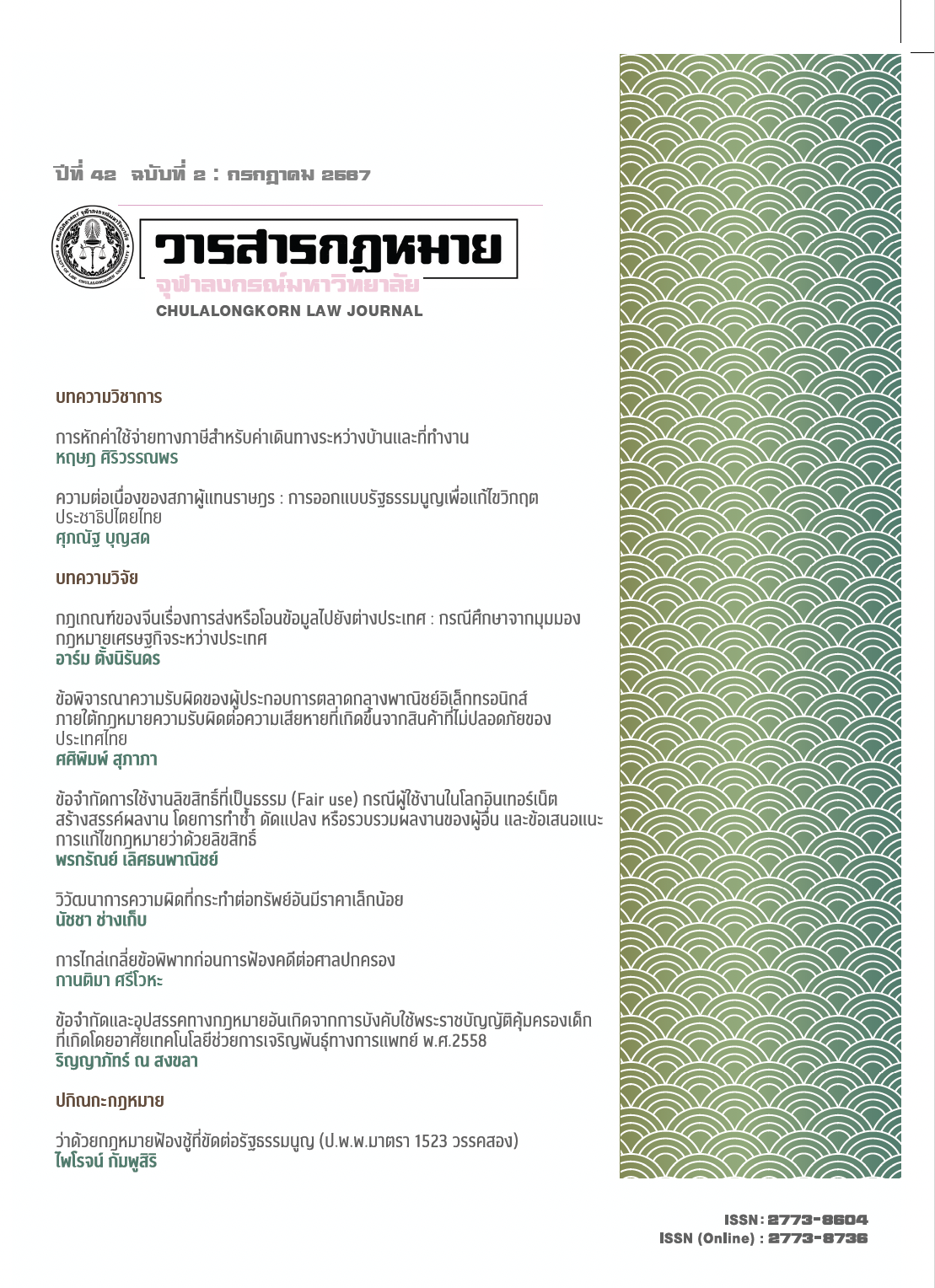ข้อจำกัดการใช้งานลิขสิทธิ์ที่เป็นธรรม (Fair use) กรณีผู้ใช้งานในโลกอินเทอร์เน็ตสร้างสรรค์ผลงาน โดยการทำซ้ำ ดัดแปลง หรือรวบรวมผลงานของผู้อื่น และข้อเสนอแนะการแก้ไขกฎหมายว่าด้วยลิขสิทธิ์
Main Article Content
บทคัดย่อ
จากสภาพสังคมปัจจุบันที่มีการใช้อินเทอร์เน็ตอย่างแพร่หลาย และเทคโนโลยีต่าง ๆ ที่พัฒนาอย่างรวดเร็ว ทำให้ผู้ใช้งานหรือบุคคลทั่วไปมีส่วนร่วมในการสร้างสรรค์ผลงานและเผยแพร่ลงบนโลกอินเทอร์เน็ต โดยเฉพาะอย่างยิ่งผลงานที่ผู้ใช้งานดัดแปลงจากผลงานอันมีลิขสิทธิ์อื่น (User-Derived Content) (“UDC”) ที่มักนำผลงานอันมีลิขสิทธิ์มาใช้โดยไม่ได้รับอนุญาตอันเป็นการละเมิดลิขสิทธิ์ และผู้ทำผลงาน UDC ส่วนมากไม่อาจอ้างข้อยกเว้นการละเมิดลิขสิทธิ์ตามพระราชบัญญัติลิขสิทธิ์ พ.ศ. 2537 (“พระราชบัญญัติลิขสิทธิ์ฯ”) เพื่อให้รับความคุ้มครองได้ จึงเป็นประเด็นที่ควรศึกษาหาแนวทางการแก้ไขกฎหมายเพื่อให้ความคุ้มครองแก่ผู้ทำผลงาน UDC อย่างเหมาะสม
เมื่อศึกษาถึงข้อยกเว้นการละเมิดลิขสิทธิ์ในกฎหมายต่างประเทศ ได้แก่ สหรัฐอเมริกา แคนาดา และสาธารณรัฐเกาหลี พบว่า สหรัฐอเมริกาและสาธารณรัฐเกาหลีกำหนดข้อยกเว้นการละเมิดลิขสิทธิ์ที่มีลักษณะเป็นการทั่วไป ซึ่งสามารถปรับใช้เพื่อให้ความคุ้มครองกับ UDC เป็นรายกรณีได้ หากพิจารณาแล้วว่าเป็นการใช้งานที่เป็นธรรม ในขณะที่แคนาดากำหนดข้อยกเว้นการละเมิดลิขสิทธิ์เป็นกรณีเฉพาะสำหรับการทำผลงานสร้างสรรค์ของผู้ใช้งานอินเทอร์เน็ต (User-Generated Content) (“UGC”) ซึ่งหากผลงาน UDC ได้ปฏิบัติตามเกณฑ์ที่กำหนดไว้แล้วย่อมได้รับความคุ้มครอง
บทความนี้จึงเสนอให้ประเทศไทยแก้ไขเพิ่มเติมข้อยกเว้นการละเมิดลิขสิทธิ์ของพระราชบัญญัติลิขสิทธิ์ฯ เพื่อให้ความคุ้มครองแก่ผู้ทำผลงาน UDC โดยนำแนวทางการกำหนดข้อยกเว้นของประเทศแคนาดามาปรับใช้ ประกอบกับการแก้ไขมาตรา 32 ให้เป็นบทบัญญัติที่เป็นข้อยกเว้นการละเมิดลิขสิทธิ์เป็นการทั่วไป โดยนำแนวทางของสหรัฐอเมริกาและสาธารณรัฐเกาหลีมาปรับใช้ เพื่อให้ความคุ้มครองการสร้างสรรค์ของผู้ทำ UDC อันสอดคล้องกับวัตถุประสงค์ของกฎหมายลิขสิทธิ์และเพื่อรองรับความก้าวหน้าของเทคโนโลยีต่อไป
Article Details

อนุญาตภายใต้เงื่อนไข Creative Commons Attribution-NonCommercial-NoDerivatives 4.0 International License.
ลิขสิทธิ์และเนื้อหาในเว็บไซต์ของวารสารกฎหมาย (รวมถึง โดยไม่จำกัดเฉพาะ เนื้อหา รหัสคอมพิวเตอร์ งานศิลป์ ภาพถ่าย รูปภาพ ดนตรีกรรม โสตทัศนวัสดุ) เป็นกรรมสิทธิ์ของวารสารกฎหมาย และผู้ได้รับการโอนสิทธิทุกราย
1. วารสารกฎหมาย ให้อนุญาตให้คุณใช้สิทธิอันไม่เฉพาะเจาะจงที่สามารถถูกถอนเมื่อใดก็ได้ โดยไม่มีค่าใช้จ่าย ในการ
- เยี่ยมชมเว็บไซต์และเอกสารในเว็บไซต์นี้ จากคอมพิวเตอร์หรือเครื่องมือสื่อสารผ่านเว็บบราวเซอร์
- คัดลอกและจัดเก็บเว็บไซต์และเอกสารในเว็บไซต์นี้บนลงคอมพิวเตอร์ของคุณผ่านระบบความจำ cache
- สั่งพิมพ์เอกสารจากเว็บไซต์นี้สำหรับการใช้ส่วนตัวของคุณ
- ผลงานที่ได้รับการตีพิมพ์โดยวารสารกฎหมาย จุฬาลงกรณ์มหาวิทยาลัย ถูกคุ้มครองภายใต้ Creative Commons Attribution 4.0 International License ซึ่งอนุญาตให้ทุกคนสามารถคัดลอก แจกจ่าย ดัดแปลง ส่งต่อ ผลงานได้ ก็ต่อเมื่อผลงานและแหล่งข้อมูลได้รับการอ้างอิงอย่างเหมาะสม
2. วารสารกฎหมาย จุฬาลงกรณ์มหาวิทยาลัย สงวนสิทธิ์ไม่อนุญาตให้คุณใช้สิทธิอื่นใดที่เกี่ยวข้องกับเว็บไซต์และเอกสารบนเว็บไซต์นี้ เช่น การคัดลอก ดัดแปลง เปลี่ยนแปลง ส่งต่อ ตีพิมพ์ แจกจ่าย เผยแพร่ จัดแสดงในที่สาธารณะ ไม่ว่าจะในรูปแบบใดก็ตาม ซึ่งเว็บไซต์หรือเอกสารบนเว็บไซต์ โดยไม่อ้างอิงถึงแหล่งข้อมูลหรือโดยไม่ได้รับอนุญาตเป็นลายลักษณ์อักษรจากวารสารกฎหมาย จุฬาลงกรณ์มหาวิทยาลัย
3. คุณอาจขออนุญาตที่จะใช้เอกสารอันมีลิขสิทธิ์บนเว็บไซต์นี้โดยการเขียนอีเมลล์มายัง journal@law.chula.ac.th
4. วารสารกฎหมาย จุฬาลงกรณ์มหาวิทยาลัย เข้มงวดกับการคุ้มครองลิขสิทธิ์อย่างมาก หากวารสารกฎหมาย จุฬาลงกรณ์มหาวิทยาลัยพบว่าคุณได้ใช้เอกสารอันมีลิขสิทธิ์บนเว็บไซต์นี้โดยไม่ถูกต้องตามการอนุญาตให้ใช้สิทธิ ดังที่กล่าวไปข้างต้น วารสารกฎหมาย จุฬาลงกรณ์มหาวิทยาลัยอาจดำเนินคดีตามกฎหมายต่อคุณได้ เพื่อเรียกร้องค่าเสียหายที่เป็นตัวเงินและคำขอชั่วคราวให้คุณหยุดการใช้เอกสารดังกล่าว ทั้งนี้ คุณอาจถูกสั่งให้ชดใช้ค่าใช้จ่ายใดๆ ที่เกี่ยวข้องกับการดำเนินการตามกฎหมายนี้
หากคุณพบเห็นการใช้เอกสารอันมีลิขสิทธิ์ของวารสารกฎหมาย จุฬาลงกรณ์มหาวิทยาลัย ที่ขัดหรืออาจขัดต่อการอนุญาตให้ใช้สิทธิดังที่ได้กล่าวไปข้างต้น โดยเชื่อว่าได้ละเมิดลิขสิทธิ์ของคุณหรือของผู้อื่น สามารถร้องเรียนมาได้ที่ journal@law.chula.ac.th
เอกสารอ้างอิง
U.S. Code § 107. “Limitations on exclusive rights: Fair use
Andy Warhol Foundation for the Visual Arts, Inc. v. Goldsmith (598 U.S. ___, 2023)
Article 29 of Copyright Act (R.S.c., 1985 c. C-42)
Article 29.1 of Copyright Act (R.S.c., 1985 c. C-42)
Article 29.21 of Copyright Act (R.S.c., 1985 c. C-42)
Article 35-5 of Copyright Act “(Fair Use of Works)
Campbell v. Acuff-Rose Music, Inc., 510 U.S. 569 (1994)
CCH Canadian Ltd. v. Law Society of Upper Canada, [2004] 1 S.C.R. 339, 2004 SCC
Christian Handke and Paul Stepan Ruth towse, “The Economics of Copyright Law: A Stocktake of the Literature”, in Review of Economic Research on Copyright Issues, 5 (2008): 2.
Dan Hagen, “Fair Use, Fair Play: Video Game Performances and “Let's Plays” as Transformative Use”, in Washington Journal of Law, Technology & Arts, 13, 3 (2018): 270-271.
Daniel J. Gervais, “The Tangled Web of Ugc: Making Copyright Sense of User-Generated Content”, in Vanderbilt Journal of Entertainment and Technology Law, 11 (2009): 858-860.
House of Representatives, “Copyright Law Revision,” [online] Available from : https://www.copyright.gov/history/law/clrev_94-1476.pdf [10 May 2023]
Jacqueline D. Lipton, “Copyright and the Commercialization of Fanfiction”, in Houston Law Review, 52, 2 (2014): 459.
Jee Young Hahn and Byoung Kyu Lee, “Brave New World: Issues and Implications of the New Fair Use Clause in the Korean Copyright Act”, in Journal of the Copyright Society of the USA, 63 (2016): 545.
Julian and Christi Favor Lamont, “Distributive Justice,” [online] Available from : https://plato.stanford.edu/entries/justice-distributive/#Scope [10 May 2023]
Khaneungnit Khaosaeng. Online Re-Creation Culture in the 21st Century: The Reconciliation between Copyright Holders, Online Re-Creators and the Public Interest. (Doctoral Dissertation, University of London, 2016)
Lee W. Lockridge, “The Myth of Copyright's Fair Use Doctrine as a Protector of Free Speech”, in Santa Clara High Technology Law Journal, 24, 1 (2007): 35-36.
Mariam Awan, “The User-Generated Content Exception: Moving Away from a Non-Commercial Requirement”, in Canadian Intellectual Property Review, 32 (2016): 17.
Megan Marrs, “Ugc 101: A Guide to User-Generated Content Marketing,” [online] Available from : https://www.wordstream.com/blog/ws/2014/04/28/user-generated-content [10 October 2021]
Michael Geist, The Copyright Pentalogy How the Supreme Court of Canada Shook the Foundations of Canadian Copyright Law, (University of Ottawa Press, 2013)
Michael McGregor, “Sports, Gifs and Copyright: Is It a Draw between Content Owners and Consumers in the Web 2.0 Era?”, in UCLA Entertainment Law Review, 23 (2016): 17.
Murray Stassen, “75% of Tiktok’s Users Say They Discover New Artists on the Platform,” [online] Available from : https://www.musicbusinessworldwide.com/tiktok-has-over-800m-active-users-worldwide-75-of-them-say-they-discover-new-artists-on-the-platform/ [26 June 2023]
OECD, Participative Web and User-Created Content Web 2.0, Wikis and Social Networking, (Paris OECD Publications, 2007)
P. Rinchakorn, “แนวความคิดทางเศรษฐศาสตร์ของสำนักคลาสิค : อดัม สมิท (Adam Smith)” [ออนไลน์] แหล่งที่มา : https://www.gotoknow.org/posts/468355 [10 พฤษภาคม 2566]
Rachel Morgan, “Conventional Protections for Commercial Fan Art under the U.S. Copyright Act”, in Fordham Intellectual Property, Media and Entertainment Law, 31 (2021): 570.
Rogers v. Koons, 960 F.2d 301 (2d Cir. 1992)
Sony Corp. of America v. Universal City Studios, Inc., 464 U.S. 417 (1984)
Starfish Academy, “เรื่องต้องรู้ ก่อน Cover เพลงลงยูทูป” [ออนไลน์] แหล่งที่มา : https://www.starfishlabz.com/blog/542-%E0%B9%80%E0%B8%A3%E0%B8%B7%E0%B9%88%E0%B8%AD%E0%B8%87%E0%B8%95%E0%B9%89%E0%B8%AD%E0%B8%87%E0%B8%A3%E0%B8%B9%E0%B9%89-%E0%B8%81%E0%B9%88%E0%B8%AD%E0%B8%99-cover-%E0%B9%80%E0%B8%9E%E0%B8%A5%E0%B8%87%E0%B8%A5%E0%B8%87%E0%B8%A2%E0%B8%B9%E0%B8%97%E0%B8%B9%E0%B8%9B [12 มีนาคม 2565]
Suh, Jinho, “Ucc (User-Created Contents) and Fair Use in Korea - in Light of “Son Dam-Bi” Decision”, in Seoul Law Journal, 53, 3 (2012): 752.
U.S. Copyright Office, “U.S. Copyright Office Fair Use Index,” [online] Available from : https://www.copyright.gov/fair-use/#:~:text=Section%20107%20of%20the%20Copyright,may%20qualify%20as%20fair%20use. [19 January 2023]
คำพิพากษาฎีกาที่ 1908/2546
จุลพล ภิญโญสินวัฒน์ และ ภูมินทร์ บุตรอินทร์, ประวัติศาสตร์และแนวคิดเกี่ยวกับทรัพย์สินทางปัญญา, (กรุงเทพมหานคร: โครงการตำราและเอกสารประกอบการสอน คณะนิติศาสตร์ มหาวิทยาลัยธรรมศาสตร์, 2559)
พุธิตา แย้มจินดา, “เมื่อผู้ใช้กลายเป็นผู้สร้าง โมเดล User-Generated Content” [ออนไลน์] แหล่งที่มา : https://www.prachachat.net/columns/news-612000 [12 มีนาคม 2565]
มาตรา 15 พระราชบัญญัติลิขสิทธิ์ พ.ศ. 2537
มาตรา 27 พระราชบัญญัติลิขสิทธิ์ พ.ศ. 2537
มาตรา 32 พระราชบัญญัติลิขสิทธิ์ พ.ศ. 2537
มาตรา 33 พระราชบัญญัติลิขสิทธิ์ พ.ศ. 2537


